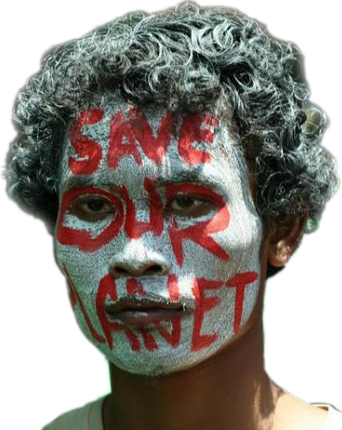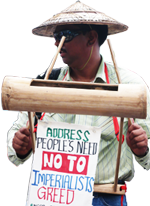| IBON International demands that developed countries have high ambition, equity and binding commitments for COP 18 |
 |
 |
|
| Tuesday, 04 December 2012 10:29 |
|
Article 3.1 of the United Nations Framework Convention on Climate Change (UNFCCC): “The developed country Parties should take the lead in combating climate change and the adverse effects thereof.”
Doha, Qatar, December 3, 2012
Climate negotiations in Doha are stalling – along with the hope of averting a temperature rise that will have catastrophic impacts on the world’s poorest.
As ministers from across the world arrive in Doha, developed countries are backing away from committing to ambitious reductions in carbon emissions as well as meaningful and immediate transfers of funds and technology to developing countries.
The US, EU, and negotiating blocs including the “Umbrella Group” (Australia, New Zealand, Russia, the Ukraine, Kazahkstan, Norway, and Japan), and the “Environmental Integrity Group” (Switzerland, Korea, Mexico), are blocking developing country demands that the Kyoto Protocol – the expiring cornerstone treaty of emissions reductions – is extended with ambitious and legally binding commitments. Likewise, while they make vague acknowledgements of the need to help developing countries, wealthy countries are avoiding concrete commitments to climate finance and technology transfer.
Both the EU and Australia are sticking to low emissions targets they will not increase without greater international action. The US claimed its “enormous” efforts on climate change should be recognized, but has pulled out of an extended Protocol and achieved a meager 3% reduction in emissions to date. The US said its positions are notbased on “what is needed”, rather what can be “sold at home”. Indeed, developed countries stand united against new, legally binding commitments on emissions reductions in line with science.
|
| Read more... |
|
| IBON International Climate Update 6 (Doha) |
 |
 |
|
| Sunday, 02 December 2012 11:05 |
|
Doha, December 1, 2012
As the first week of the 18th meeting of the Conference of Parties (COP18) draws to a close, fault lines between developed and developing countries are becoming clearer. Developing countries are continuing to adhere to demands that developed countries demonstrate commitment to tackling climate change through increased levels of ambition in emission reduction targets, equity in both reduction targets and through providing finance, and binding commitments onboth issues. Developed countries are largely opposing these demands – there remain huge gaps in commitments to emissions reductions in line with scientific evidence, and a clear lack of will to make firm commitments to climate finance and technology transfer.
|
| Read more... |
| IBON International Climate Update 5 (Doha) |
 |
 |
|
| Sunday, 02 December 2012 10:59 |
|
Doha, Saturday, December 1, 2012
The Green Climate Fund (GCF), the principal multilateral financial mechanism todeal with climate change, is foreseen to be the subject of yet more intensedebates at the 18th Conference of Parties (COP) of the United Nations Framework Convention on Climate Change (UNFCCC).
A Report of the Green Climate Fund and guidance to the GCF has been prepared by the co-chairs have been culled from different submissions from the UmbrellaGroup (Australia, Canada, Japan, New Zealand, Norway, the Russian Federation, Ukraine and the US), European Union, Philippines, United States and the Like-Minded Developing Countries (LMDC is a platform for like minded developing countries to exchange views and coordinate positions on the climate negotiations with the view to contributing to achieving the combined goals of environmental sustainability, social and economic development, and equity).
|
| Read more... |
| IBON International Climate Update 4 (Doha) |
 |
 |
|
| Friday, 30 November 2012 21:51 |
|
Doha, Friday, November 30, 2012
US Chides NGOs, Outlines Its Positions Not Based on Need
The US chief negotiator at COP 18 issued a strong rebuke to NGOs in an off-the-record meeting, which has now been published in Indian media.
Jonathan Pershing told NGOs they should recognize that the US makes it possible for them to be present at COP 18. And while many parties and NGOs at COP18 are calling for agreements based on science, Pershing said that US positions are not based on the reality of “what is needed”. He went on to rubbish the concept of sharing atmospheric space, underlining that US positions are based on what can be sold to the US Congress.
"We are one of the funders to make it possible for you to be at the table,” Pershing told NGOs present in the meeting. “I hope you recognize that many of you who come to the meetings you do, the US fights for you at every chance to give you a chance to be in this room."
In what could be considered an arrogant aside, Pershing noted that not all Parties agree with the US: "What we also think is the participation of a lot of countries out there includes the ones that disagree with us."
|
| Read more... |
| IBON International Climate Update 3 (Doha) |
 |
 |
|
| Friday, 30 November 2012 16:01 |
|
Doha, Friday, November 30, 2012
The Subsidiary Body for Implementation (SBI) chair circulated a draft text on the SBI agenda item on “loss and damage”(from climate change) for further discussion and negotiation by country Parties. In the contact group negotiation country Parties agreed to continue their work on the text while they expressed their concern on few specific paragraphs.
The G77/China group expressed its reservations on paragraph 7, which requests the Subsidiary Body for Scientific and Technological Advice (SBSTA), under the Nairobi work program on impacts, vulnerability and adaptation to climate change, consider activities aimed at enhancing a relevant knowledge base and information base on the technicalities of loss and damage. It believes that if loss and damage are put under SBSTA then its sprit of implementation under the mandate of SBI will be weakened.
|
| Read more... |
| IBON International Climate Update 2 (Doha) |
 |
 |
|
| Friday, 30 November 2012 15:59 |
|
Doha, Thursday, November 29, 2012
Four main items were discussed at today’s meeting of the Contact Group on Finance, i.e. general statements on the report on the workprogramme on Long Term Finance, the report of the Standing Committee, report on the Green Climate Fund (GCF) and initial guidelines; and on the arrangements between the Conference of Parties and the GCF.
Several Parties made brief remarks on procedural matters, particularly reiterating the need for the meetings to be transparent and open to observers, and clarifying that equal attention to the four agenda items does not necessarily mean equal allocation in time devoted to discussing these. The Chair reminded Parties that it has been decided that the first and last contact group meetings would be open as they need to produce agreed elements under finance by December 6th.
As regards the co-chairs’ report on the work programme on Long Term Finance, it was important to press ahead with concrete actions atpolitical (covering scale and mobilization of climate finance) and technical levels (financing the GCF and the enhancement of enabling environments).
|
| Read more... |
|
|
More Articles...
- IBON International Climate Update 1 (Doha)
- IBON Climate Updates No.5: Bangkok Climate Change Conference 2012
- IBON Climate Updates No.4: Bangkok Climate Change Conference 2012
- IBON Climate Updates No.3: Bangkok Climate Change Conference 2012
- IBON Climate Updates No.2: Bangkok Climate Change Conference 2012
|
|
| Page 2 of 25 |
 The Peoples' Movement on Climate Change (PMCC) seeks to advance the People's Protocol on Climate Change as the Southern peoples' strategy and response to the climate change issue.
The Peoples' Movement on Climate Change (PMCC) seeks to advance the People's Protocol on Climate Change as the Southern peoples' strategy and response to the climate change issue.



